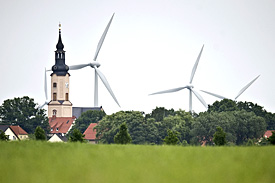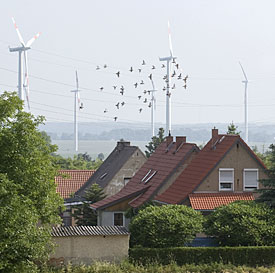Press release from March 26, 2009
Climate change aims need to be better integrated into land use planning, economic and transport policies
Helsinki/Leipzig. Specific measures to tackle climate change, such as emissions trading, will only be successful if they are coherently supported by other government policies addressing economic and social issues, says a report published today by the Partnership for European Environmental Research (PEER). PEER membership is formed from seven of the biggest European environmental research institutes.

Windmill power stations are helping to reduce CO2 emissions.
Photo: André Künzelmann

A lot of people feel disturbed by windmills near their settlements.
Photo: André Künzelmann
The report explains that, in order to create an effective, Europe wide climate policy, climate change issues must be better integrated into both general and sector-specific policies such as taxation, transportation, and land use planning. By doing this the necessary changes in production processes and consumption patterns to tackle climate change will be achieved.
Lead author, Dr. Per Mickwitz, from the Finnish Environment Institute (SYKE), said, "Although the inclusion of climate change mitigation and adaptation in general governmental programmes and strategies has substantially increased in recent years, much more is needed in terms of integrating climate issues into specific policy measures. Annual budgets, environmental impact assessments and spatial planning procedures are three examples of existing measures which we believe have significant potential to be climate policy instruments."
The new report assesses the degree of climate policy integration in six different European countries, at national and local levels, as well as within key policy sectors such as energy and transport. It analyses measures and means to enhance climate policy integration and improve policy coherence.
The report shows that when climate policy is integrated into an increasing number of policy sectors such as energy, transport and land use, many latent conflicts are reopened. These include conflicts over nuclear power, taxation, hydro power, mobility and other issues involving values and ideology. If such conflicts are not recognised early they provide a barrier to effective climate policy integration.
Professor Pat Nuttall, Director, Centre for Ecology & Hydrology, UK, said, "As PEER chair, I know how important it is to work together within Europe to ensure that future decisions will be based on the best information available, minimizing risks and, in some cases, turning threats into opportunities. There is a huge need for increased policy and programme evaluation from a climate change perspective, and this report is a first step towards achieving this goal."
Over recent decades, climate change research has focused primarily on the climate system impacts in general terms, and on mitigation. In the future, new challenges will be posed by the emergence of climate change adaptation policies across Europe. Climate policy integration and coherence will be essential in order to bring together the environmental, economic and social impacts of both adaptation and mitigation policies.
A second report from PEER, comparing National Adaptation Strategies to climate change across Europe, will be published in May 2009.
Publication:
Per Mickwitz, Francisco Aix, Silke Beck, David Carss, Nils Ferrand, Christoph Görg, Anne Jensen, Paula Kivimaa, Christian Kuhlicke,
Wiebren Kuindersma, María Máñez, Matti Melanen, Suvi Monni, Anders Branth Pedersen, Hugo Reinert and Séverine van Bommel 2009.
Climate Policy Integration, Coherence and Governance. PEER-Report No 2. Helsinki: Partnership for European Environmental Research. 92pp.
Studie als pdf zum Download
More information:
Dr. Per Mickwitz
Lead author:
Finnish Environment Institute SYKE
Phone: +358-400-148847
Dr. Per Mickwitz
Dr. Silke Beck
German case study: "Climate Policy Integration, Coherence and Governance in Germany"
Helmholtz Centre for Environmental Research (UFZ)
Phone: + 49-341-235-1733
Dr. Silke Beck
oder
Helmholtz Centre for Environmental Research (UFZ)
Press office
Tilo Arnhold
Phone +49 341 235 1269
presse@ufz.de
Johanna Kainulainen
Web journalist, Finnish Environment Institute SYKE
Phone +358 400 397 696
firstname.lastname@ymparisto.fi
Created in 2001, PEER is a partnership of seven large European environmental research centres. PEER members cover the full spectrum of the environmental sciences and combine basic with applied research anticipating societal needs. PEER members carry out their research in strategic and interdisciplinary multi-annual programmes, working with partners worldwide to solve complex environmental challenges. The vision of PEER is to be a world leader in integrating knowledge and expertise for sustainable development, in support of policymakers, industry and society.
PEER member institutes:
- ALTERRA - Green World Research Centre, Niederlande
- CEH - Centre for Ecology and Hydrology, Großbritannien
- CEMAGREF - Centre for Agriculture and Environmental Engineering Research, Frankreich
- JRC-IES - Institute for Environment and Sustainability (European Commission), Italien
- NERI - National Environmental Research Institute, Dänemark
- SYKE - Finnish Environment Institute, Finnland
- UFZ - Centre for Environmental Research Leipzig-Halle, Deutschland
At the Helmholtz Centre for Environmental Research (UFZ) scientists research the causes and consequences of far-reaching environmental changes. They study water resources, biological diversity, the consequences of climate change and adaptation possibilities, environmental and biotechnologies, bio energy, the behaviour of chemicals in the environment and their effect on health, as well as modelling and social science issues. Their guiding research principle is supporting the sustainable use of natural resources and helping to secure these basic requirements of life over the long term under the influence of global change. The UFZ employs 900 people at its sites in Leipzig, Halle and Magdeburg. It is funded by the German government and by the states of Saxony and Saxony-Anhalt.
The Helmholtz Association helps solve major, pressing challenges facing society, science and the economy with top scientific achievements in six research areas: Energy, Earth and Environment, Health, Key Technologies, Structure of Matter, Transport and Space. With 25,700 employees in 15 research centres and an annual budget of around EUR 2.3 billion, the Helmholtz Association is Germany’s largest scientific organisation. Its work follows in the tradition of the great natural scientist Hermann von Helmholtz (1821-1894).
